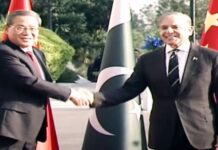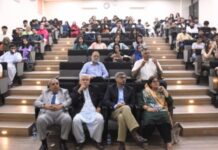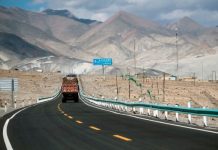By Muhammad Sohail Bhatti, from GUANGZHOU, China
Usually, the world remains under the focus of media binoculars round-the-clock, but it was the media’s turn to be focused by the whole world when China’s city of Guangzhou hosted the 5th World Media Summit (WMS).
The 5th WMS gathers over 450 participants from 101 countries and regions, including representatives of 197 mainstream media outlets, think tanks, government agencies, diplomatic missions to China, as well as UN agencies and international organisations, which has started from Dec. 2 in Guangzhou and will be concluded on Dec. 8 in Kunming.
I am honoured to be one of the participants on the invitation of Xinhua News Agency, the main host of the event. This is my 2nd trip to China and with every moment, I have seen a different world of modernity, innovation, development, rich culture, and warm respect and hospitality.
Leaders of the world’s top media groups, including Xinhua, Reuters, AFP, Associated Press, TASS, Internews Pakistan, NNI, and others, have come to feature in the conference to discuss the ways to develop cooperation and tackle rising challenges.
The summit provides a platform for media representatives from across the world to exchange ideas and perspectives on cooperation. The WMS is a unique forum at the international level that China hosted in its typical style of creating lovely and soothing ambiance which can help foster greater understanding and collaboration. The summit provides an opportunity for media professionals to network and build relationships helping them to strengthen ties between media organisations and promote global media cooperation.
The WMS also helped to promote economic and social development by highlighting the role of the media in fostering understanding and cooperation and playing its role in the development of mankind. It also provided new ideas and thoughts to enhance media development by promoting the exchange of ideas and best practices.
In addition to these general gains, I also got specific insights into multiple areas, like; the summit explored the opportunities and challenges faced by the media industry in the digital era. I came to know the responsibility of the media to promote peace and development, the importance of media literacy, and how to teach it to others.
I have been in touch with the name of China and some sort of its stories since my childhood through media and additionally and have been promoting the Chinese perspective since I joined the media more than 15 years ago. But now what I am seeing with my naked eyes is more amazing and beyond my thoughts.
Last time, I attended the “Silk Road Global Communication Forum” in October 2023 in Xi’an city of China’s Shaanxi province where I was moved to seek great development and a gentle nation from Urumqi to Xi’an. During this visit to WMS, I saw how China has developed on modern lines not only on the infrastructure and technology side but also on the managerial side by successfully hosting such big events. I observed the organisers and coordinators of the events and learned how to work efficiently, with novelty and discipline.
The rich Chinese culture and its preservation by the government and Chinese people is also very impressive. During this tour of over one week, I have seen so much that I can report tens of articles for my readers. I would like my readers and especially my country fellows to stop looking at Western propaganda and biased reporting and try to learn more about the infrastructure and technological development of China, its cleanliness, green atmosphere, discipline, hard work, modernity, and innovation.
Media cooperation between Pakistan and China holds important potential for enhancing bilateral relations and fostering mutual understanding between the two countries. Pakistan and China have over 1.65 billion population and the media cooperation between the two can benefit in multiple fields in the long run.
In my view, Increased media cooperation can promote a deeper understanding of each country’s culture, history, and perspectives, reducing misconceptions and fostering mutual respect. Collaborative media initiatives can facilitate the exchange of news, stories, and content, providing a more comprehensive and balanced view of each country to their respective audiences.
Media partnerships can enable joint coverage of issues of mutual interest, such as regional development, trade, and environmental concerns, promoting collaboration and addressing shared challenges. Media cooperation between China and Pakistan can facilitate the exchange of cultural content, such as films, music, and literature, strengthening cultural ties and appreciation between the two countries.
Joint efforts by Pakistani and Chinese media can effectively combat disinformation and negative narratives. Media collaboration can facilitate the exchange of knowledge, expertise, and training opportunities, enhancing the capabilities of media professionals. Media cooperation can contribute to regional stability and cooperation by fostering understanding, dialogue, and positive narratives about the relationship between Pakistan and China.
Media collaboration can play a crucial role in promoting awareness and understanding of CPEC projects, highlighting its benefits, and fostering support for this important initiative. Media partnerships can facilitate people-to-people exchanges, promoting cultural understanding and friendship between the citizens of Pakistan and China. Media cooperation can play its role in building a shared future for Pakistan and China, based on mutual respect, understanding, and collaboration.








































